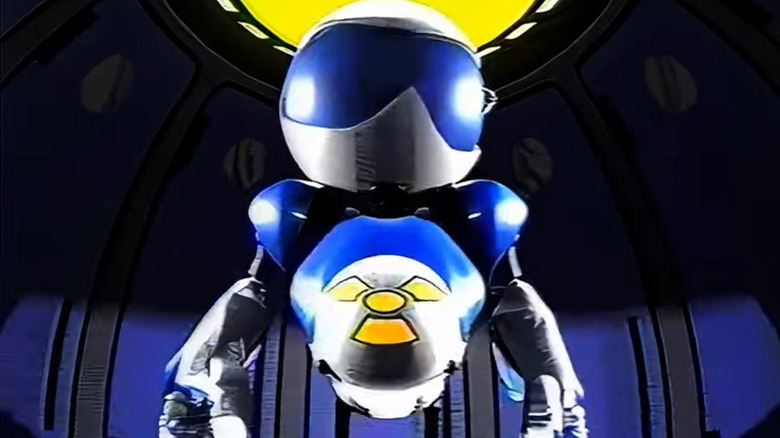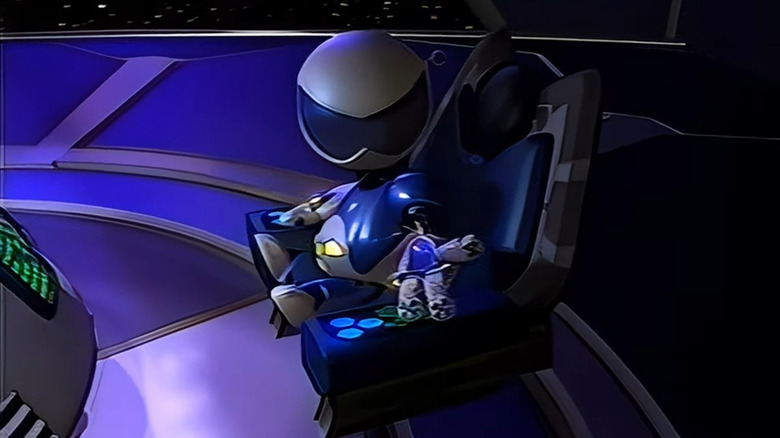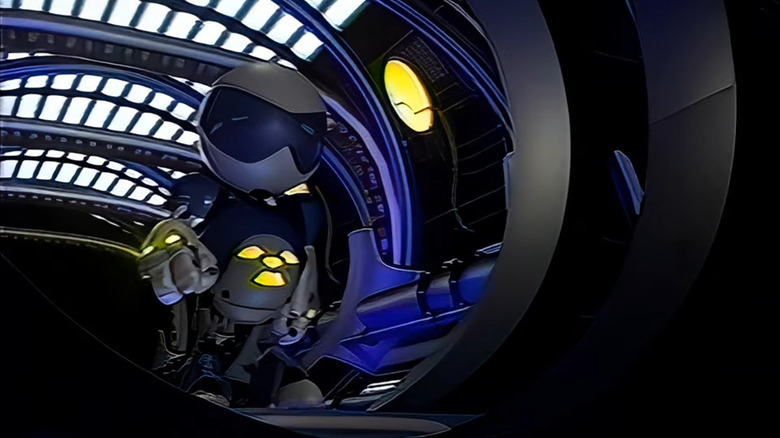Why Cartoon Network Canceled Toonami In 2008, According To Its Creators
"Toonami" debuted on the Cartoon Network in 1997, back when the network was just hitting its stride. Cartoon Network debuted in 1992, and originally offered mostly old animated reruns. It was, for years, the best place to find old Droopy cartoons, as well as Looney Tunes, Tom & Jerry cartoons, old DC superhero fare, and reruns of Hanna-Barbera trash like "Scooby-Doo" and "The Flintstones."
In 1994, the network had the brilliant idea to repurpose a largely forgotten Hanna-Barbera character named Space Ghost, transforming him into a talk show host. "Space Ghost Coast to Coast" set a new dadaist tone for the Cartoon Network, proving that it could make hip, self-aware, original content in addition to its blocks of reruns. In 1996 and 1997, Cartoon Network launched a quartet of new shows — "Dexter's Laboratory," "Johnny Bravo," "The Powerpuff Girls," and "Cow and Chicken" — and their reputation was solidified. It was now a destination station.
About the same time, Cartoon Network launched a block of programming called "Toonami," a portmanteau of "cartoon" and "tsunami." The "Toonami" block was "hosted" by a CGI animated version of Moltar (C. Martin Croker) and he provided intros for the nighttime broadcasts of various action/adventure shows, many of them imported from Japan. In its early years, "Toonami" included "Voltron," "Robotech," "Dragon Ball Z," and "Sailor Moon" as well as American shows like "Thundercats," "Jonny Quest," "The Herculoids," and several others. Eventually, a new mascot, T.O.M., took over.
Everything seemed to be working fine for "Toonami" through 2008 when, quite abruptly, the block was canceled. The fans were shocked.
"Toonami" co-creator Jason DeMarco talked to Complex back in 2017 and explained what happened to the block. Hint: it had everything to do with the bottoming out of the home video market.
The anime boom
For many young viewers, "Toonami" was granted first access to hit Japanese shows like "Sailor Moon," "Tenchi Muyo," "Mobile Suit Gundam Wing," and many others. Anime, it should be recalled, was considered an oblique cult interest in the United States throughout the 1980s, with only a few shows breaking through to the Saturday Morning mainstream. It wasn't until the release of "Akira" in 1988 that the medium began to proliferate into the American mass consciousness, and even then, a lot of Japanese animation wasn't readily available; 1990s anime collectors will likely bore you with stories of paying $50 to $100 for single imported VHS cassettes.
As the 1990s continued, however, imported anime shows began to take hold in earnest. Studio Ghibli films were widely released in American theaters by Miramax and Disney, while Pokémon took the world by storm. Anime VHS cassettes dropped in price, and the medium finally became effectively mainstream. "Toonami" was there to reap the benefits, and audiences stayed in droves to learn about "Outlaw Star," ".hack//Sign," and "Cardcaptors."
Then, even more quickly, home video fell out of vogue. DeMarco remembered the rapid expansion and the sudden collapse.
"Looking back it was probably when we went from being on five days a week to just being on Saturday. There was this five year explosion of home video and 'Dragon Ball' and 'Pokemon' and 'Spirited Away' winning the Oscar. There was a wave. And then it receded because the bottom fell out of the home video market; a bunch of fake 'Toonamis' popped up and died; and I think it was a cross between the wider cultural consciousness moving away from anime and our network having different priorities."
"Toonami" rode the boom, but couldn't survive the bust.
The abrupt ending
The Complex article ran down the abrupt ending of "Toonami," describing a typical death knell of moving from daily programming ... to one day on a weekend. This was in 2004. If a show is moved to Friday nights, it's not long for this world. Moving "Toonami" to the weekends bore a similar sense of doom. The move was perhaps inspired by low ratings, or perhaps Cartoon Network's need to clear up its schedule for other shows. It's also likely that the anime shows they broadcasted were too intense and violent for a typical, after-school crowd.
In honor of the show's 10th anniversary, on March 17, 2007, "Toonami" announced a brand new clump of shows they were to begin broadcasting. The T.O.M. sequences were re-vamped and improved, and the new hosts (one of them voiced by Tom Kenny) announced all the anime shows and features they would be presenting for the next few weeks. At the end of that month, "Spirited Away" was to be shown. It was a big deal. The re-vamp didn't help, though, and the series was off the air less than a year later.
It turns out the re-vamp was merely the last step at the end of a long downward journey. DeMarco noted:
"[W]hen they moved us to Saturday and they started promoting 'Toonami' less, the writing was on the wall for a good two years. Our bosses were pretty transparent, so it wasn't a huge surprise when they told us we were going to be canceled."
Luckily, "Toonami" eventually returned. In 2012, Adult Swim ran Tommy Wiseau's film "The Room" under the "Toonami" banner as an absurd prank, but fan reactions were so overwhelming that Cartoon Network resurrected it in 2013.
One can watch "Toonami" to this day.


